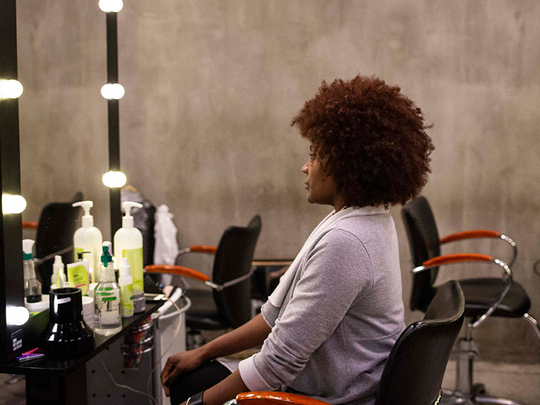
SAO PAULO, Brazil: Bruna Aparecida smiled cautiously at her reflection as a hairdresser snipped the last strands of her straight hair. Her head was crowned with curls.
“I didn’t know myself without straight hair,” said Aparecida, 27, who used chemical relaxers for nearly a decade before deciding to go natural. She used to be the only black woman at the bank where she works who had kinky hair. Today, she is one of six.
“It’s all the rage this year. Many of my friends are doing it,” she said.
Black and brown Brazilians make up over half of the country’s population, but you wouldn’t know it by looking at the beauty industry. Brazil’s innovative hair straightening treatments — sold around the world — have long chased white standards of beauty.
Ten years ago, it was not unusual to find robed women packed into a room at a salon, covering their mouths with rags to avoid inhaling fumes while hairdressers doused their locks in formaldehyde for a pin-straight look. Now, a growing number of black Brazilians are ditching the hair straighteners and embracing their curls.
The resurgence of natural hair has mirrored a rise in black empowerment in Brazil. The number of Brazilians identifying as black grew 15 per cent in four years, according to the 2016 census. Meanwhile, inspired by the movie Black Panther, Afrofuturism — a movement that explores a futuristic vision of Africa and the African diaspora — has taken off. It has emerged as a symbol of resistance.
For Aline Bibiano, 27, bullied by her white classmates for her “bad” hair, she started relaxing it at 8 years old. When she decided to grow out her hair six years ago, she turned to the internet for support. “I said, ‘Is anyone else out there doing this?’” There, she discovered tips on how to go about the process, which can take three years. Today, Bibiano writes a popular column on curly and kinky hair for AllThingsHair.com. “Women now have the references I didn’t have,” she said. “On Instagram and Facebook, girls are coming to terms with curly hair.” The deep well of prejudice against black hair is just beginning to be drained. One in three Brazilian women said in a 2017 Google study that they have encountered prejudice because of their hair.
A political act
For many black Brazilians, a return to natural hair is a way to reconnect to their heritage.
“It is a political act,” said Andressa Maciel, a 26-year-old filmmaker. “My hair is the first thing people see. It says, ‘This is Andressa, this is her ancestry.’”
Women like Maciel have found their muse in Tas Arajo, one of the first actresses to portray a wealthy woman with kinky hair, on a Brazilian television show a decade ago.
Today, Arajo stars in Mister Brau, a comedy about the misadventures of a well-to-do black couple who move into an elite all-white neighbourhood in Rio de Janeiro.
“When we talk about the role of television, especially in Brazil, we see that some sense of social responsibility can change a country,” Arajo said. “Brazil has discovered its own identity. Cultural changes don’t happen overnight. We are in a very beautiful [process].”
Watching Arajo on television inspired Aparecida Jesus, 34, to free her straightened locks four years ago. Today, her 10-year-old daughter, Ana Luiza, is the same age as Jesus was when she first started using chemical relaxers. Ana Luiza gets bullied at school for her big hair, just like her mom did.
A growing market for black beauty
The black beauty market has been growing an estimated 20 per cent a year in Brazil, helped by products geared toward women transitioning to more natural looks, according to Kline Market Research Group. Online searches for “Afro hair” have tripled here in the past two years, according to Google Labs. #CabeloCrespo, a “kinky hair” hashtag once used on photos of straightening makeovers, now generates thousands of images of billowy Afros.
“I had no idea of the size of the market when I opened my salon,” said Almiro Nunes, 44, owner of Curls Clinic, a beauty parlor in So Paulo that specialises in naturally curly hair. Nunes, who started with 10 clients eight years ago, sees an average of 60 clients a day and plans to expand to a second salon.
It’s not just the salons that seem to have gotten the memo. Pharmacies and department stores that used to primarily stock shampoos for white clients now have whole sections dedicated to natural black hair. This has opened up options for black women and girls who felt they had no choice but to straighten their hair.











